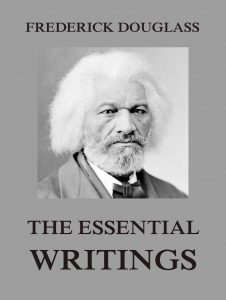The Essential Writings – Frederick Douglass
Frederick Douglass was born in 1817 and lived for ten years as a slave upon a Maryland plantation. Then he was bought by a Baltimore shipbuilder. He learned to read, and, being attracted by “The Lady of the Lake,” when he escaped in 1838 and went disguised as a sailor to New Bedford, Mass., he adopted the name Douglas (spelling it with two s’s, however). He lived for several years in New Bedford, being assisted by Garrison in his efforts for an education. In 1841, at an anti-slavery convention in Nantucket, he exhibited such intelligence, and showed himself the possessor of such a remarkable voice, that he was made the agent of the Massachusetts Anti-Slavery Society and became a leader of the abolitionist movement. This edition comprises his essential writings:
Narrative Of The Life Of Frederick Douglass
My Bondage And My Freedom
Abolition Fanaticism In New York
The Heroic Slave
The Life And Times Of Frederick Douglass: From 1817-1882

The Essential Writings
Format: Paperback.
The Essential Writings.
ISBN: 9783849675592.
Available at amazon.com and other venues.
Biography of Frederick Douglass (from wikipedia.com)
Frederick Douglass (born Frederick Augustus Washington Bailey; c. February 1818 – February 20, 1895) was an African-American social reformer, abolitionist, orator, writer, and statesman. After escaping from slavery in Maryland, he became a national leader of the abolitionist movement in Massachusetts and New York, gaining note for his dazzling oratory and incisive antislavery writings. In his time, he was described by abolitionists as a living counter-example to slaveholders’ arguments that slaves lacked the intellectual capacity to function as independent American citizens. Northerners at the time found it hard to believe that such a great orator had once been a slave.
Douglass wrote several autobiographies. He described his experiences as a slave in his 1845 autobiography, Narrative of the Life of Frederick Douglass, an American Slave, which became a bestseller, and was influential in promoting the cause of abolition, as was his second book, My Bondage and My Freedom (1855). After the Civil War, Douglass remained an active campaigner against slavery and wrote his last autobiography, Life and Times of Frederick Douglass. First published in 1881 and revised in 1892, three years before his death, it covered events during and after the Civil War. Douglass also actively supported women’s suffrage, and held several public offices. Without his approval, Douglass became the first African American nominated for Vice President of the United States as the running mate and Vice Presidential nominee of Victoria Woodhull, on the Equal Rights Party ticket.
Douglass was a firm believer in the equality of all peoples, whether black, female, Native American, or recent immigrant. He was also a believer in dialogue and in making alliances across racial and ideological divides, and in the liberal values of the U.S. Constitution. When radical abolitionists, under the motto “No Union With Slaveholders”, criticized Douglass’ willingness to dialogue with slave owners, he famously replied: “I would unite with anybody to do right and with nobody to do wrong.”
(The text of the last section was taken from a Wikipedia entry and is available under the the Creative Commons Attribution-ShareAlike License.)
Publisher’s Note: This book is printed and distributed by Createspace a DBA of On-Demand Publishing LLC and is typically not available anywhere else than in stores owned and operated by Amazon or Createspace.
